FileDog anatomy lateral skeleton view.jpg
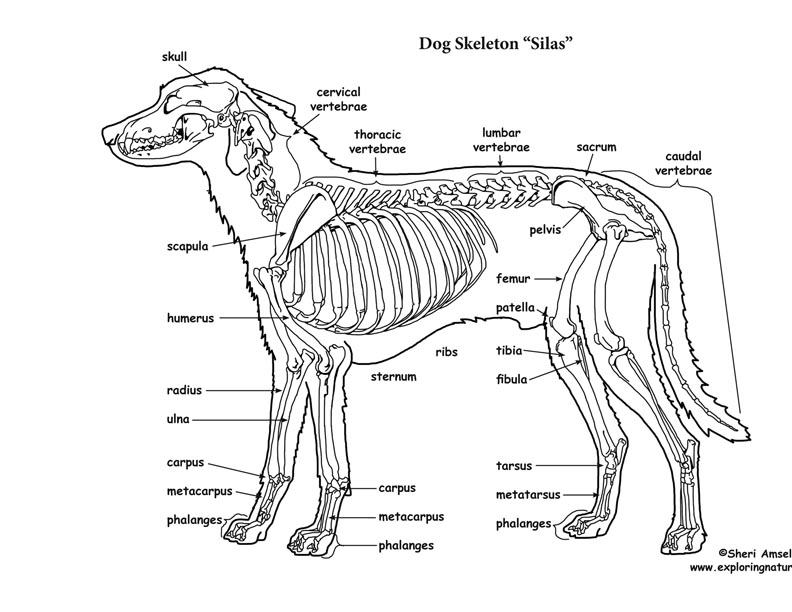
Dog Skeletal Anatomy
This is an overview of the canine skeleton, pointing out features that help in identification and orientation.If you find this helpful, please let me know by.

Dog skeleton with major bone elements labeled (Davis, 1987, p. 54
Come and check all categories at a surprisingly low price, you'd never want to miss it. Awesome prices & high quality here on Temu. New users enjoy free shipping & free return.
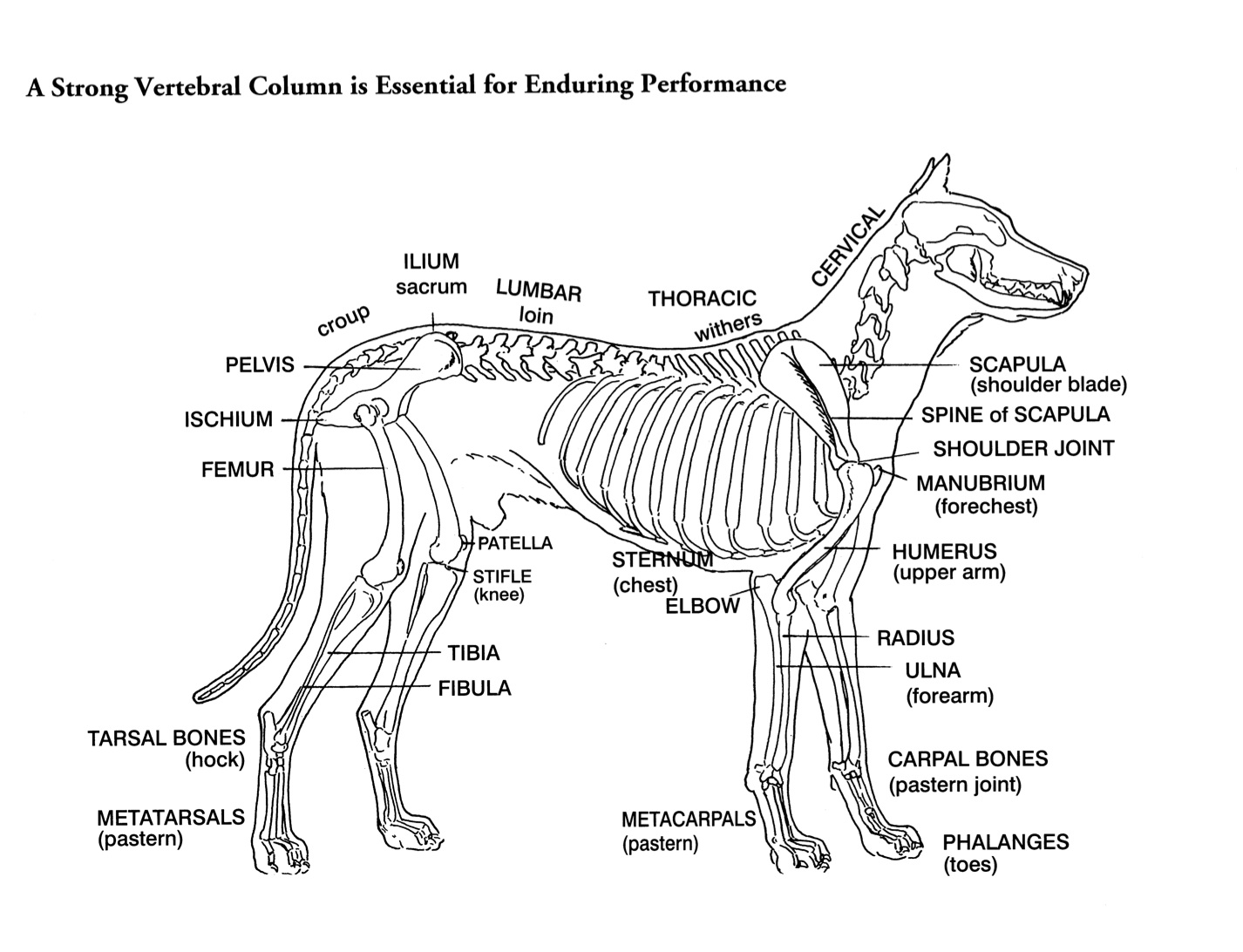
Helen King on Structure Evaluation Susan Garrett's Dog Training Blog
Figure 5-14 Detailed skeletal anatomy of the sacrum from a caudolateral view , sacrum and caudal 1 or Cd1 vertebra from a lateral view , Cd4 vertebra from a cranial view , and Cd6 vertebra from a dorsal view . (From Evans HE: Miller's anatomy of the dog, ed 4, Philadelphia, 2013, WB Saunders.)

FileDog anatomy lateral skeleton view.jpg
Dog Skeleton Anatomy. With the large range of breeds and dog sizes, despite their difference in appearance, it might be surprising to hear dog anatomy is generally the same with regards to physical anatomy and characteristics. Dogs have a skeletal system. However, dogs don't have a collar bone, unlike humans; providing a larger.

maryrosedog Dog skeleton, Dog anatomy, Dog skull
Components of the Musculoskeletal System in Dogs. Bones provide rigid structure to the body and shield internal organs from damage. They also house bone marrow, where blood cells are formed, and they maintain the body's reservoirs of calcium and phosphorus. Old bone tissue is constantly replaced with new bone tissue in a process called.

PetMassage Chart 3 Skeleton of the Dog · PetMassage™ Training and
It provides information about a dog's skeletal, reproductive, internal, and external anatomy, along with accompanying labeled diagrams. After mating, dogs experience something called a copulatory tie, wherein they remain in the coital position. The male dog dismounts the female at this time. The dogs can remain in this position from a few.
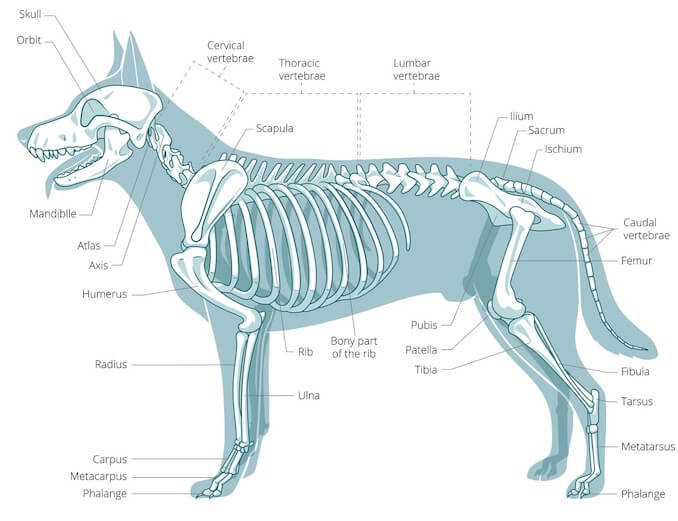
A Visual Guide to Dog Anatomy (Muscle, Organ & Skeletal Drawings) All
Dog skeleton anatomy. The bones of the dog skeleton anatomy serve to support and protect the visceral organs. Again, all the bones of the dog skeleton provide lavers for muscular action. You will find a total of three hundred and twenty-one (321) bones in the dog skeleton. The axial skeleton contains one hundred and thirty-four (134) bones.
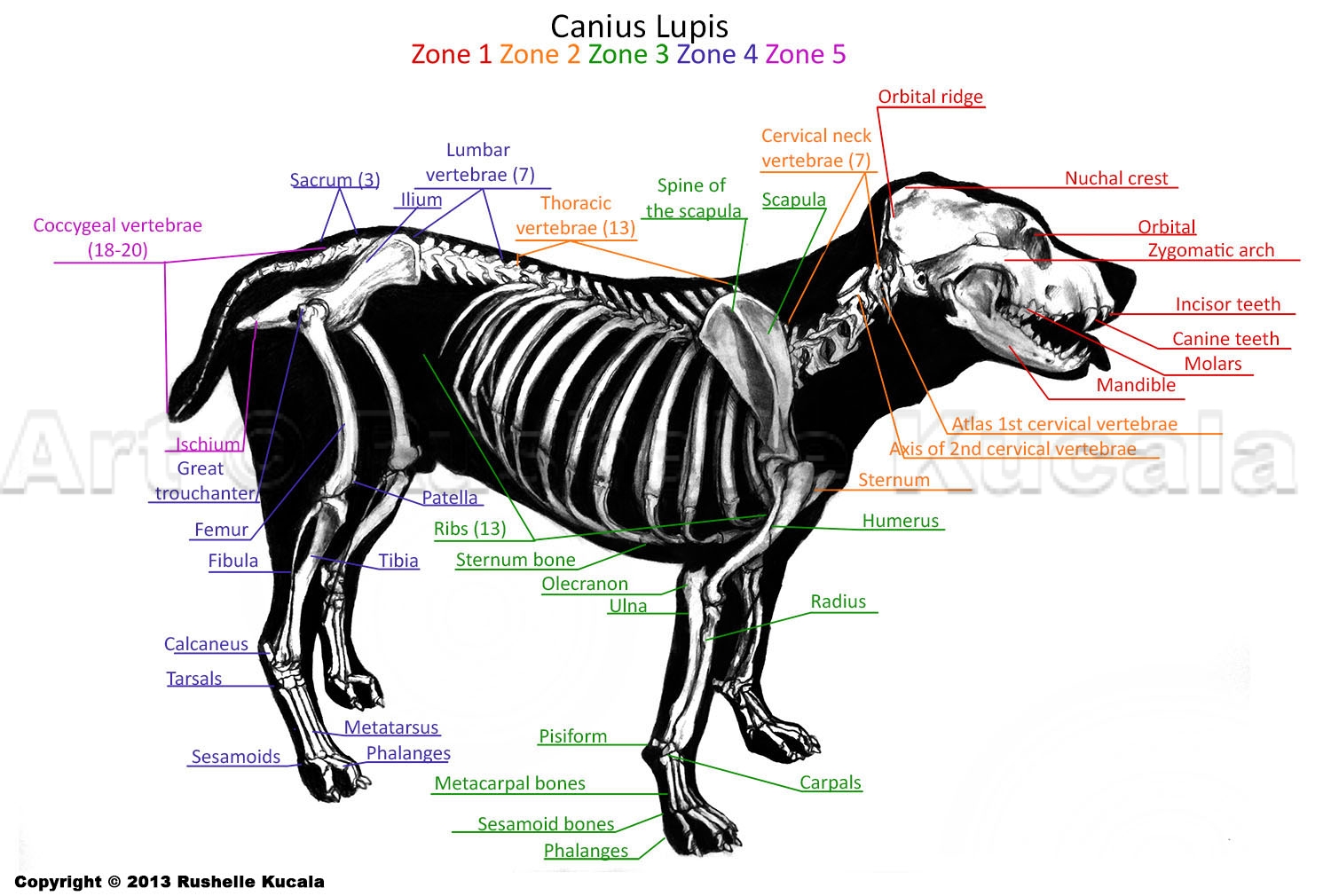
Dog Skeleton Anatomy by TheDragonofDoom on DeviantArt
Dog skeleton. As with any vertebrate animal, the skeleton of a dog has the function of supporting the body for movement and protecting its internal organs. We can divide the canine skeleton into three main sections: Axial skeleton: skull, spine, ribs and sternum bones. Appendicular skeleton: bones of the extremities.

Vintage 1935 Dog Veterinary Print Skeleton Of Dog Anatomy Of Dog Canine
This comprehensive Canine Skeletal Anatomy Poster / Worksheet (Interactive & Printable PDF) is a great revision tool for veterinary students, animal lovers or individuals studying dog anatomy. It is anatomically accurate, vibrant and highly detailed, making it easy to recognise and learn the bones of a canine. It can be used as an offline study.

Dog skeleton 101 Dog Anatomy Bones Animal Hackers
In the big picture, the dog skeleton is made of two basic parts: axial and appendicular (limbs). Axial skeleton = head (skull) + the spine (made of vertebrae) + ribs + sternum. Appendicular = forelimb bones + hindlimb bones. The axis of the dog skeleton is composed of the skull, spine (made of vertebrae), ribs and sternum (made of sternebrae).

Anatomy of a male dog crosssection, showing the skeleton and internal
Dog anatomy comprises the anatomical studies of the visible parts of the body of a domestic dog.Details of structures vary tremendously from breed to breed, more than in any other animal species, wild or domesticated, as dogs are highly variable in height and weight. The smallest known adult dog was a Yorkshire Terrier that stood only 6.3 cm (2.5 in) at the shoulder, 9.5 cm (3.7 in) in length.
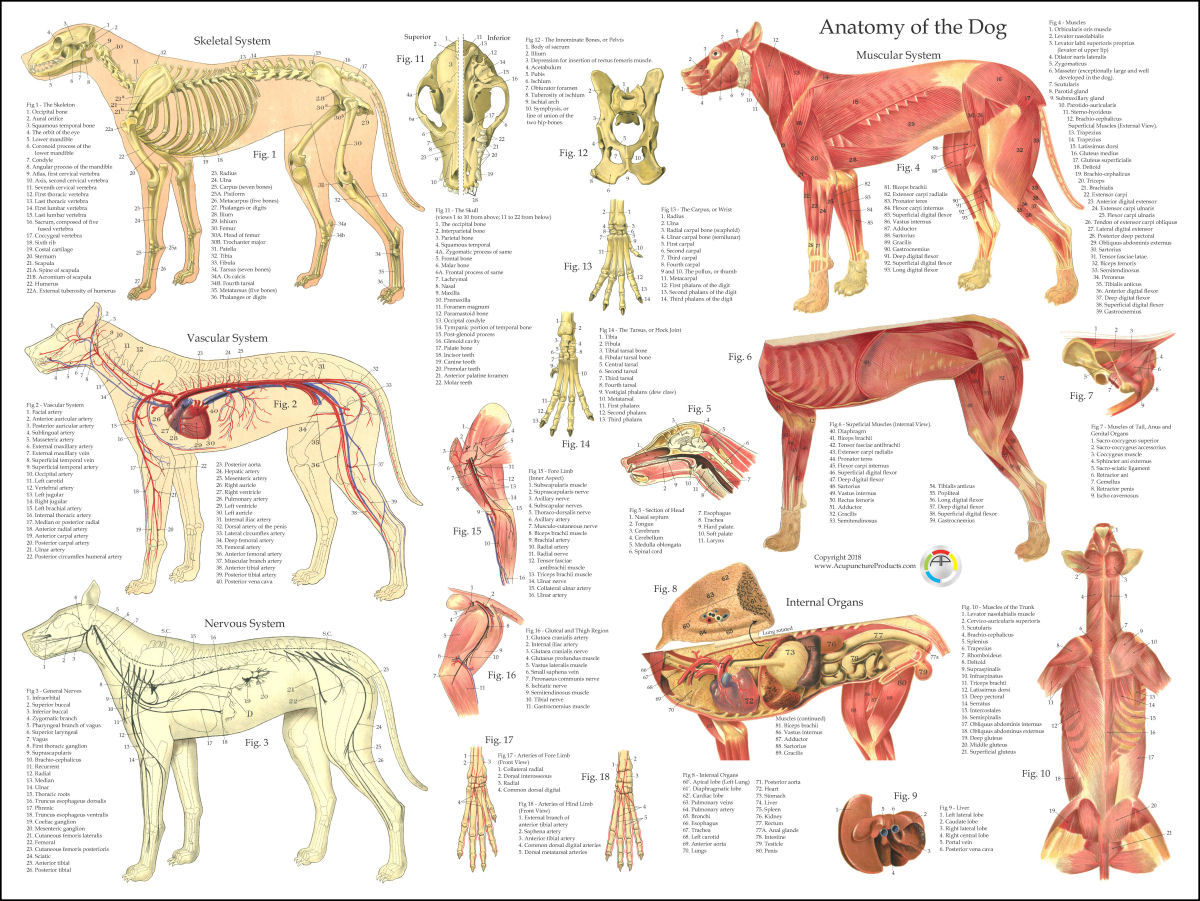
Dog Muscle Skeletal Veterinary Internal Anatomy Poster 18 X 24
The skeletal system is the 'framework' upon which the body is built - it provides support, protection and enables the animal to move (Fig. 3.1). The joints are considered to be an integral part of the skeleton. The skeletal system is made of the specialised connective tissues, bone and cartilage. Fig. 3.1 The skeleton of the dog showing.
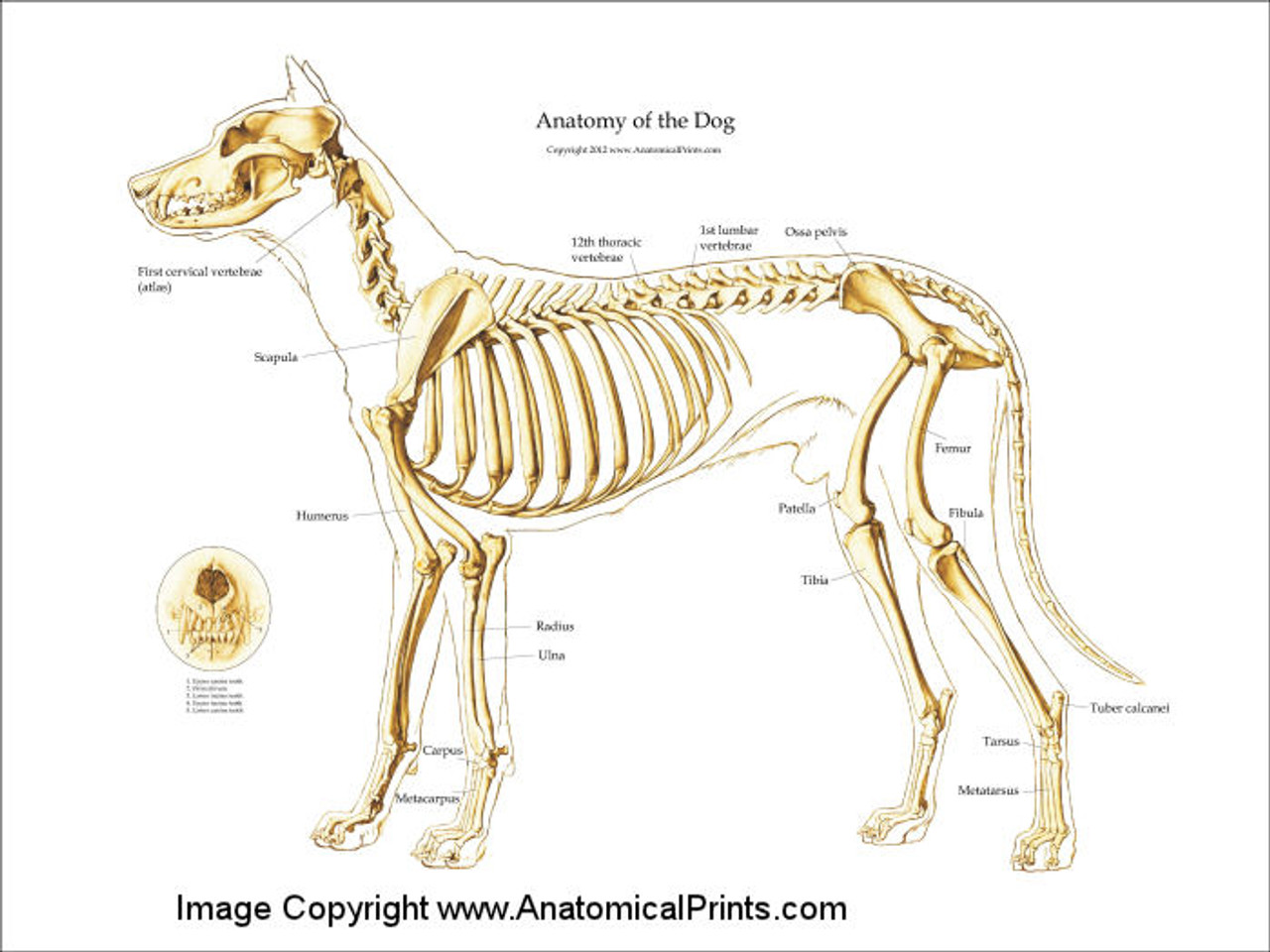
Canine Skeleton Poster Clinical Charts and Supplies
The cat has a small coronoid fossa medial to the radial fossa that accommodates the coronoid process of the ulna during elbow joint flexion.; The cat has a supracondylar foramen near the medial condyle allowing the passage of the median nerve and brachial blood vessels.; There is an intermediate tubercle between the greater and lesser tubercles in the horse's intertubercular groove.

Skeletal abnormality in dogs and cats
Anatomy atlas of the canine general anatomy: fully labeled illustrations and diagrams of the dog (skeleton, bones, muscles, joints, viscera, respiratory system, cardiovascular system). Positional and directional terms, general terminology and anatomical orientation are also illustrated.
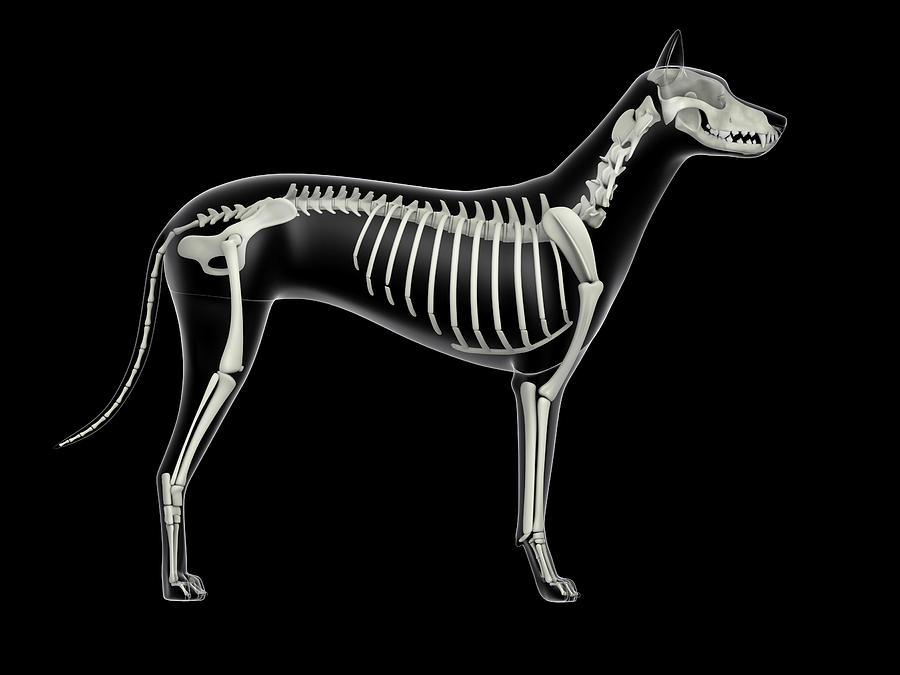
Skeletal System Of A Dog, Xray Side Photograph by Stocktrek Images
One of the most important parts of a dog's anatomy is their skeleton. A dog's skeleton is made up of many different bones, which provide structure and support for their body. Dogs have over 300 bones in their body, which is more than humans who have around 206 bones. Their skeleton includes their skull, spine, ribcage and limbs.

Dog Anatomy Dog Skelton
The Anatomage Dog is the first highly detailed dog anatomy atlas that comprehensively features internal organs, including vascular systems and muscular-skeletal structures. Originating from real dog data, the Anatomage Dog exhibits the highest level of anatomical accuracy. All of its volumetric 3D and individual structures are segmented, users.